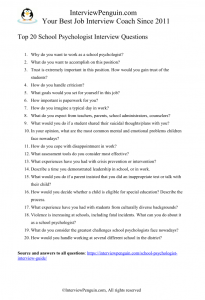The demand for school psychologists rises every year in a direct proportion to the number of school-aged children who experience mental and emotional issues. I am not sure whether we can call this a success of the profession. Nevertheless, hats off if you decided to pursue this career. Few professionals are as needed as psychologists are, in the current state of affairs in human society. The recent pandemic just added fuel to the fire…
Good intentions and honest interest to become a great psychologist won’t suffice you to succeed in the interview for this interesting job, however. You will have to demonstrate excellent communication skills, empathy, understanding for the world of children and their problems, as well as the right attitude to work, and theoretical knowledge of psychology.
The hiring committee will ask you some personal, behavioral, and technical questions, while trying to create a complete picture of your personality and skills. Let’s have a look at the questions, and how you should answer them.
Table of Contents
Why did you decide to pursue this career?
Cliche answers work the best in this case. Say that you feel for the children, for the problems they experience. Say that you believe to have a good understanding for their world and challenges that threaten their well-being, and want to help them.
Alternatively you can tell us a story about your own experience with a school psychologist (during your school time), and how this positive experience motivated you to pursue the career in the same field.
Why do you want to work here, and not for some another educational institution/school district?
The more you know about their school, the easier it will be to answer the question. First option is to say that you are local, and have a good understanding for the local community and the problems children experience there.
Another option is to point out something that makes their school special. This can be many things. Their reputation, their attitude to special needs children, their study programs, the benefits they offer to teachers and other school workers, etc.
The third option is to simply say that the location of the school fits you perfectly, or that they were the only school looking for a school psychologist, and so you applied with them.
How do you imagine a typical day in work?
A tricky question. Many people would say that they’d be ready in their office, waiting for the children to come, or for the teachers/administrators to bring them in. Then they will do their best to talk to them and to help them face the adversity they experience. This is not a really good answer though. It shows passivity, while you should show a proactive approach to work.
Tell the hiring committee that you plan to actively talk to teachers, counselors, and administrators, and observe the children during events and classes, trying to identify children who may need your help. You may even suggest talking to children on a regular basis, or doing any other things that will help you to spot the problems before they turn into something bigger (such as an act of violence)
Needless to say, the talk of two human beings (you and one of the students) is still the most important part of this job. But you should show that you won’t just sit in the office, waiting for something to happen…
How do you plan to gain trust of the children?
Listening first, speaking second. Showing your own vulnerability sometimes. Being there for them, anytime they need you. Stepping out of your comfort zone. Being a part of the community rather than an isolated person who’s hiding in their cabinet, someone students hardly know.
Trust is crucial if you want to do a good job of a school psychologist. Show the interviewers that you know how to build it.
In your opinion, what are the most common mental and emotional problems children face nowadays?
This is not an easy question, and the answer can differ from one city to another (or even from one school to another). What is more, people in the hiring committee may not even know the right answer–and that’s why they need you onboard…
Nevertheless, you should name at least a few problems and illnesses. Generally speaking, you can list anxiety disorders, mood disorders, eating disorders and even schizophrenia. Speaking about emotional problems, you won’t do wrong with pointing to the feelings of deficiency, lack of recognition, false self image, and other issues that affect many children in 21st century.
What are your expectations on teachers and school administrators?
This is another tricky question. On one hand, a great educational institution is always a team effort. Teachers have to cooperate with other staff members, including the psychologists and counselors, to ensure that each child is allowed to reach their full potential in school.
On the other hand, you should focus mostly on your own job, trying to do it as well as you can, without relying on help from other personnel.
Tell the hiring committee that you hope to have a fruitful and friendly cooperation with other staff members, but that you expect the most from yourself–and will try to do a great job as a school psychologist.
One of the students tells you that he thinks about committing suicide. What will you do?
Each job has some limits. Being pregnant is one thing, being suicidal another. You should demonstrate that you understand the difference. Contacting parents is advisable in this case (unless you know that involving them would make the situation worse).
While young people often “play” with the word suicide, and use it while trying to gain advantage (of teachers, of their boyfriends/girlfriends, etc) we can never (or almost never) know whether they aren’t serious. At school, we are not in a position to take their words lightly.
At the same time, however, if someone confides in you with their suicidal plans, it is a great responsibility on your side, and you should perhaps tell them something before involving anyone else. Show them all the support in the world. Be there for them. Show them their own worth…
Disclaimer: This is my personal view on the situation and steps you should take, based on talks with several school psychologists, and my own experience in the field. In no way should you consider it as a general guidance for all psychologists.
Other questions you may face in your interview
- What do you consider the toughest aspect of this job?
- Violence is increasing at schools, including fatal incidents. What can you do about it as a school psychologist?
- How do you cope with disappointment?
- How would you decide whether a child is eligible for special education? Describe the process.
- How would you handle working at several different school in the district?
- What goals would you set for yourself in this job?
- What would you do if a parent insisted that you did an inappropriate test or talk with their child?
- …
Conclusion, brilliant answers to all questions
If you are not sure how to answer the questions (you are not alone), have a look at an eBook I wrote, the School Psychologist Interview Guide.
Multiple brilliant answers to twenty five most common school psychologist interview questions (including difficult behavioral questions) will help you find the right words in every moment of the hiring process, and make a great connection with the interviewers.
My colleagues from education administration helped me with the list of questions, and also provided feedback on the answers I suggested. The final result should reflect the reality of the interviews for this position, and what is expected from a good candidate in 2021 and beyond.
You can see some great sample answers to interview questions on the eBook page, so even if you do not want to purchase anything, it still makes sense to check it out here: eBook page.
Thank you for reading, I wish you good luck on a big day!
Matthew
* You can also download the list of questions in a one-page long PDF, and practice your interview answers anytime later:

May also interest you:
- School counselor interview questions.
- Special Education teacher interview questions.
- Why do you want to work for our school district?


